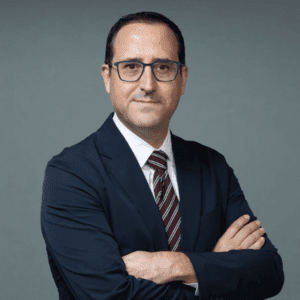Dr. Augusto Villanueva Rodríguez, Medical Director of the Liver Cancer Program at NYU Langone Health, discusses why Black, Latinx, Asian, and Indigenous patients often face poorer outcomes in liver cancer care. He explains how late diagnosis, limited access to curative therapies, and low participation in surveillance programs contribute to disparities. Dr. Villanueva encourages patients to know their risks, get tested for hepatitis B and C, manage fatty liver disease, and speak up for equitable, culturally sensitive care. His message: prevention, early action, and self-advocacy save lives.
Related Resources
Transcript
Lisa Hatfield:
Dr. Villanueva, for someone newly diagnosed with liver cancer, how do you explain this diagnosis to your patients? And how do you help them understand their treatment options?
Dr. Augusto Villanueva:
So the first time that I deliver the diagnosis of liver cancer to a patient, I try to be very concise with information, because if you think about it, a cancer diagnosis is life-changing. It’s a life event for anybody. So there is a lot of anxiety that goes along with that diagnosis, and patients tend to be confused, and they don’t understand information after you tell the actual diagnosis. So I try to be very concise, and it’s a process. It’s not something that happens just one day. You can deliver the information in the first visit, but then there are always follow-up visits where you can address the questions, clarify some aspects, because that day is generally very stressful for the patient. So just clear information, go directly to the point and provide a plan up front. I think for patients, it’s very important to understand what’s going to happen? What are the next steps? What is the next thing that I need to know that’s going to happen as part of this journey? So that anticipation of seeing what’s next, I think is also very useful for patients.
Lisa Hatfield:
Okay, thank you. And what questions do your patients most frequently ask or struggle to understand?
Dr. Augusto Villanueva:
So, in liver cancer, unlike the majority of tumors, patients at the same time, they have the cancer, and they also have underlying liver disease. They mostly have cirrhosis. So, some patients, they have a hard time to understand the fact that both cancer and the cirrhosis and the liver disease will determine the treatment plan and the prognosis, and what’s going to happen. So, I think most of my patients, they struggle with that, and they don’t understand why some patients get some treatments, and I don’t get those treatments. Well, the reason is because your liver essentially will not tolerate that type of treatment. So I try to clarify and be very explicit about what’s the stage of the liver cancer and what’s the stage of the liver disease, because both combined, at the end of the day, will determine what’s the best treatment option for the patient.
Lisa Hatfield:
Okay, thank you. And do you have an [ACT]IVATION tip for that question?
Dr. Augusto Villanueva:
I think my [ACT]IVATION tip will be: when you get a diagnosis of liver cancer, do not leave the office without asking all the questions that you have. Because if you go home with some questions, it’s going to create a lot of anxiety. It’s not going to help anybody. So, make sure that you ask all the questions that you have to your provider before leaving the room after that diagnosis.
Lisa Hatfield:
Many patients face challenges like lack of insurance, transportation, or language barriers. If patients have access to educational resources before their visits, what topics would be most valuable for them to understand?
Dr. Augusto Villanueva:
The fact that most patients have, at the same time, liver disease, or cirrhosis, and liver cancer. And information about how you can take care of your liver during this process is going to be very valuable, and the reason for that is there are some treatments that are very good for liver cancer, but have significant toxicity for the liver. In other words, if your liver is not fit enough, if your liver is not working fine, those treatments will not be available to you. And that’s an issue. And again, patients sometimes have a hard time understanding that.
So, I think if you can find resources that explain what you can do to take care of your liver, and it’s very simple. There’s a lot of products and supplements that are being offered, they’re being marketed to protect the liver. Most of them don’t work, but what we know that works is: limit your alcohol use, avoid alcohol. Follow a healthy diet, limit the amount of sugar and candy, processed foods, that’s also very good for the liver. And keep an active life, increase your physical activity, those things we know are good for the liver. And I think patients, if they understand that, they see that, you know, the question of what can I do? What can I do to improve my liver? Well, these are the things that you can do. And that would certainly help towards getting the liver in the best shape possible to be able to undergo all the treatments that would come directed primarily to treat the liver cancer.
Lisa Hatfield:
Okay, thank you. Do you have an [ACT]IVATION tip for that question?
Dr. Augusto Villanueva:
Well, if you have liver disease and liver cancer, my [ACT]IVATION tip will be: take care of your liver. Love your liver. Make sure that you don’t drink alcohol, healthy diet and physical activity. Those are the three secrets, it’s not a secret, but the three things that will for sure help to keep the liver in the best shape to undergo the treatment that’s going to be needed for the cancer.



